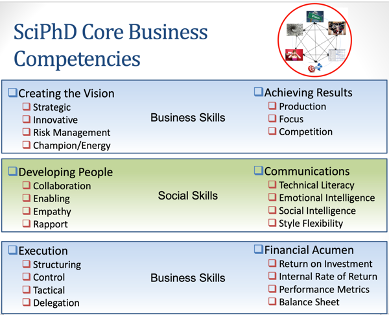What Exactly Is the SciPhD Business of Science Certificate of Achievement?
In short, if you see this certificate in someone’s LinkedIn profile, or on their resume, or in their application package for a position in your company, this candidate has successfully completed SciPhD’s Business of Science Certificate Program that focuses on eight specific skill areas valued by professional organizations. These areas are:
- Business of Science (your scientific, business, and social identities)
- Communications (Emotional and Social Intelligence)
- Developing Your People (Mentoring and Leadership)
- Networking and Building Relationships
- Project Management
- Team Performance and Continuous Improvement
- Financial Literacy
- Negotiations
SciPhD’s experiential learning approach immerses students in collaborative team-based scenarios to experience, practice and refine skills and behaviors associated with these eight areas. Over the past 12 years, graduates of SciPhD’s Certificate Program have risen to senior positions in companies ranging from small startups to multinational biotech, pharmaceutical, consulting, and financial organizations. Below, we will be exploring and explaining more about what exactly our graduates learn in these eight important areas.
The one thing you can rest assured from day 1, is that our SciPhD graduates will quickly integrate into any company’s work environment as productive team members.
For academic institutions with PhD graduate and postdoctoral programs you can find out more about SciPhD’s training programs here.
For professional organizations who value and would benefit from business-ready PhD-level talent, you can find out more about SciPhD’s talent acquisition programs from this link.

